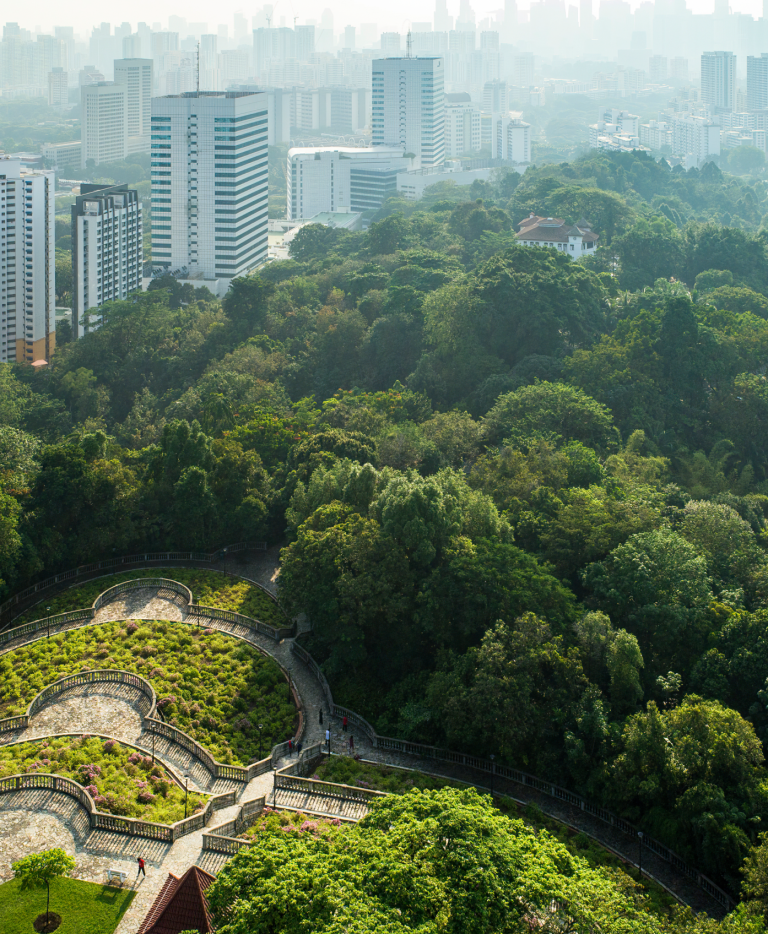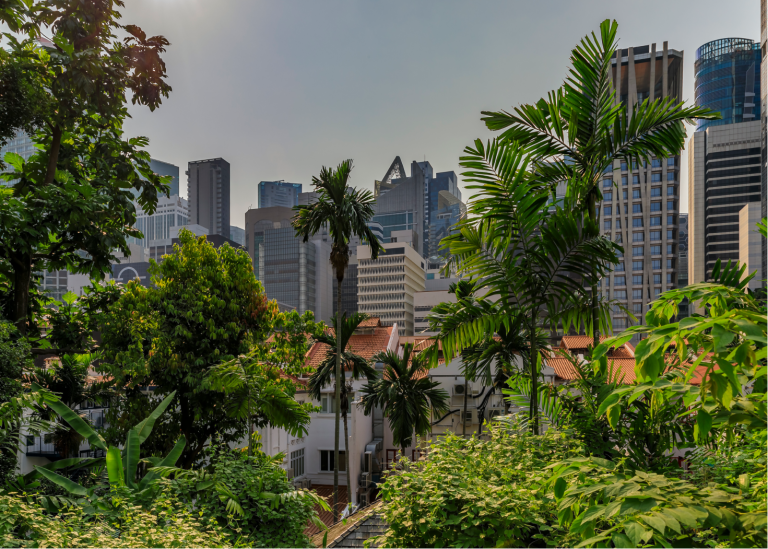What is an employer of record in Singapore?
An employer of record (EOR) in Singapore is a strategic partner that serves as the legal employer of your employees living in Singapore. An EOR assumes all employment duties and liabilities on your behalf, managing payroll, benefits, taxes, and compliance. Partnering with an EOR service allows you to hire employees in Singapore without the burden of setting up a local entity in Singapore or navigating intricate labor laws.
Employment Guide to Hiring in Singapore
Explore the topics below to learn everything you need to know about hiring employees in Singapore.
Hiring in Singapore
Employment agreements in Singapore
Employers must issue employees a written contract of the key employment terms no later than 14 days after an employee begins work. The key employment terms include the following:
- Job title and work description
- Employment start date
- Daily work hours, work days per week, and rest days
- Salary and pay period
- Types of leave
Probationary periods in Singapore
There is no legal requirement for a probationary period in Singapore, but they are permissible and usually set between three and six months.
Average working hours in Singapore
The Singaporean Employment Act describes normal working hours as not exceeding eight hours daily or 44 hours weekly.
How an employer of record helps you hire in Singapore
An employer of record (EOR) allows you to hire in Singapore without the headache of setting up a legal entity in Singapore. Because most companies don’t have the resources or extensive knowledge to compliantly hire in international markets, an EOR helps you engage top talent from anywhere and support them based on their local needs.
As an industry-leading EOR in Singapore, Velocity Global is a trusted partner in hiring in Singapore. By acting as the legal employer, we hire your new team members through local, compliant employment contracts—and you get back the time and flexibility to focus on your growing business.
Draft compliant contracts in minutes
Quickly generate and send employment contracts that comply with local HR laws. Stay ahead in the talent race and start hiring now.

Payroll in Singapore
Payroll cycles in Singapore
Singapore’s Employment Act designates that an employee’s salary must be paid at least once a month within seven days after a salary period’s end.
Wages in Singapore
According to the Singaporean Ministry of Manpower, there is no prescribed minimum wage for local or foreign employees in Singapore.
Bonus payments in Singapore
There is no legal obligation under the Employment Act of Singapore for employers to reward employees with a contractual or discretionary bonus. However, a 13-month bonus is customary at the inclination of the employer.
How an EOR helps you run payroll in Singapore
An employer of record (EOR) in Singapore helps you compliantly manage your global team payroll, ensuring consistent and accurate pay and tax withholdings for employees living in Singapore. Think of an EOR as your international HR team that understands the complex labor laws and payroll regulations of different markets.
Partnering with a trusted EOR partner like Velocity Global for global payroll administration in Singapore offers numerous benefits, like access to a centralized platform for payroll data and reporting, secure data privacy and protection, and time and cost savings.
Taxes in Singapore
Tax due dates in Singapore
Tax returns need to be filed by April 15 for hardcopy filing and by April 18 for electronic filing.
Tax thresholds in Singapore
Regardless of resident status, all Singapore-sourced income is taxable. Income from outside Singapore is only taxable if it’s received within the country by a Singaporean resident through a partnership in Singapore.
Non-resident individuals are taxed at a flat rate of 22% in 2022 and 24% in 2024. However, employment income is taxed at a flat rate of 15% or at resident rates with personal relief, whichever is higher.
The Singaporean income tax brackets for 2022 to 2024 are:
- Up to SGD 20,000: 0%
- From SGD 20,000 to SGD 30,000: 2%
- From SGD 30,000 to SGD 40,000: 3.5%
- From SGD 40,000 to SGD 80,000: 7%
- From SGD 80,000 to SGD 120,000: 11.5%
- From SGD 120,000 to SGD 160,000: 15%
- From SGD 160,000 to SGD 200,000: 18%
- From SGD 200,000 to SGD 240,000: 19%
- From SGD 240,000 to SGD 280,000: 19.5%
- From SGD 280,000 to SGD 320,000: 20%
- From SGD 320,000 to SGD 500,000: 22%
- From SGD 500,000 to SGD 1,000,000: 22% in 2022 and 2023. 23% in 2024.
- Above SGD 1,000,000: 22% in 2022 and 2023. 24% in 2024.
Health insurance in Singapore
Through a mixed financing system, Singapore’s healthcare system is universal with a multiplayer healthcare financing framework. Multiple schemes and payers typically overlap and cover a single medical treatment. The 3Ms system includes the following programs:
- MediShield Life: Singapore’s public statutory insurance system covers large bills from hospital services
- MediSave: Singapore’s national medical savings scheme helps cover out-of-pocket medical payments
- MediFund: Singapore’s national government welfare program caters to the most at-need residents who cannot afford out-of-pocket medical payments
Pension in Singapore
Employees in Singapore are subject to eligibility requirements for the state’s old-age retirement pension. When employees reach 55 years of age, savings from contributions made to their Central Provident Fund’s (CPF) Special account and Ordinary account will be transferred to their Retirement account. Employees 55 years of age are eligible to receive their savings as a lump sum. Employees 65 years of age are eligible to withdraw up to 20% of their Retirement account savings. Additionally, 65 years is the eligibility age for receiving monthly payouts from a CPF account.
How an EOR helps you calculate taxes in Singapore
Payroll taxes are taxes imposed on employers and employees. They vary between countries, making compliance a hurdle for businesses that may not have the expertise or resources to navigate payroll taxes in Singapore.
As an employer of record (EOR) with a tenured global footprint, Velocity Global is knowledgeable in handling all aspects of payroll for you, including calculating and filing payroll taxes, withholding and remitting taxes, and issuing tax forms in Singapore.
Calculate payroll contributions in Singapore
Please fill out your contact information and hiring details, and an expert from our team will be in touch with you shortly.
Leave Entitlements in Singapore
Annual leave in Singapore
Employees are entitled to annual leave if they are covered by Singapore’s Employment Act and have at least three months of service. Employees are entitled to a minimum of seven days and receive an additional day of leave after each year of service, limited to a maximum of 14 days.
Parental leave in Singapore
Employees in Singapore are guaranteed 16 weeks of paid maternity leave upon the condition of having worked for at least three months, and the child is a citizen of Singapore. If the child is not a Singaporean citizen, maternity leave consists of 12 weeks.
Employees in Singapore are eligible for two weeks of Government Paid Paternity Leave (GPPL) after meeting the following conditions:
- The child is a citizen of Singapore
- The employee has been legally married to the child’s mother between conception and birth
- The employee has worked for his employer for at least three months prior to childbirth
- Adoptive fathers are eligible for paternity leave if the child is a citizen of Singapore.
Sick leave in Singapore
Employees are eligible for sick leave if:
- They are covered under the Singaporean Employment Act
- They have worked for their employer for at least three months
- They have informed or tried to inform their employer of their absence within 48 hours
The Singaporean Employment Act designates sick and hospitalization leave depending on an employee’s length of service. The leave entitlements are as follows:
Regional and national holidays in Singapore
Singapore has 10 public holidays in a calendar year, which are not included in the minimum paid leave entitlement and are taken in addition to annual leave. The following holidays are national holidays recognized by all of Singapore:
- New Year’s Day (January 1)
- Chinese New Year (January or February, the specific days fluctuate each year)
- Good Friday (March or April, the specific day fluctuates each year)
- Labor Day (May 1)
- Hari Raya Puasa (March, April, or May, the specific day fluctuates each year)
- Vesak Day (May or June, the specific day fluctuates each year)
- Hari Raya Haji (May, June, or July, the specific day fluctuates each year)
- National Day (August 9)
- Deepavali (October or November, the specific day fluctuates each year)
- Christmas Day (December 25)
How an EOR helps you manage leave and PTO in Singapore
An employer of record (EOR) supports companies by managing annual leave, paid time off (PTO), and even local holidays all over the world—including Singapore. When it comes to handling a company’s annual leave requirements, an EOR ensures compliance with local labor laws in Singapore at every step.
Some EOR partners, like Velocity Global, provide a platform that helps you oversee employee time off in Singapore. By outsourcing leave and time-off management to Velocity Global, you can ensure accurate tracking, compliance, and seamless administration, freeing up valuable time and resources for other business priorities.
We’re here to help you hire in Singapore
Get expert guidance with global hiring, payroll, benefits, and compliance.

Employment Benefits in Singapore
Federal benefits in Singapore
The Ministry of Manpower provides overall administration of labor relations, workforce needs, and old-age retirement procurement assistance.
The Ministry of Health regulates the country’s public healthcare system.
The Central Provident Fund (CPF) is a mandatory social security savings scheme funded by contributions from employers and employees. The CPF is an integral part of the Singaporean Social Security system, as it maintains all employees’ old-age retirement pensions, housing needs, and healthcare coverage.
The CPF funds are classified into three separate accounts: the Ordinary account, the MediSave account, and the Special account. The Ordinary account is used to purchase housing, make investments, or pay for education. The MediSave account is used for medical expenses and health insurance. The Special account is used for retirement savings and pension.
Supplemental benefits in Singapore
Supplemental benefits are additional benefits employers provide to improve workers’ benefits packages. Examples include:
- Private medical insurance
- Home office allowances
- Transportation benefits
While all employees receive basic insurance through the Ministry of Health, employers may provide additional health benefits. In Singapore, offering additional health and life insurance or a small allowance intended for supplemental insurance is standard practice. Other supplemental benefits include commuter and transportation benefits and home office allowances.
How an EOR helps you administer benefits in Singapore
As the legal employer for your employees living in Singapore, an employer of record (EOR) administers statutory benefits and ensures they are enrolled and contributing to the appropriate government benefits. Additionally, an EOR partner manages the administration of supplemental benefits, including ensuring employees in Singapore receive tailored, expert-vetted, and competitive supplemental benefits packages.
Velocity Global makes understanding foreign statutory and supplemental benefits easy and offers your workforce competitive benefits packages tailored specifically to Singapore and beyond.
Terminations in Singapore
Notice periods in Singapore
If an employee is covered under Singapore’s Employment Act:
- The notice period’s length must be the same for both the employer and employee
- If the employment contract doesn’t include a notice period, the employer must comply with the Employment Act’s minimum notice periods, which depend on an employee’s length of service and span between one day to four weeks
- Payment in lieu of notice is permissible by either employer or employee
- Either employer or employee may immediately terminate the employment relationship due to a willful breach of contract by the other party
Severance pay in Singapore
Singaporean law does not have any statutory requirements for severance payments. The employment contract must address any entitlement to severance payments.
How an EOR helps you process terminations in Singapore
An employer of record (EOR) is responsible for processing terminations in the event you need to terminate an employee in Singapore. This may include adhering to local labor laws and regulations regarding termination procedures, including notice periods, severance pay, and any other statutory requirements.
As an EOR with experience in terminations, Velocity Global helps businesses minimize the risk of legal disputes or liabilities in Singapore.
FAQ
-
How does Velocity Global’s EOR help businesses expand into Singapore?
An experienced employer of record (EOR) partner like Velocity Global makes it easy for companies to quickly and compliantly build and support distributed teams in Singapore without the time and effort of establishing an entity. Velocity Global hires, pays, and manages your team in Singapore on your behalf, allowing you to quickly engage talent without setting up local entities or worrying about violating local employment regulations. Partnering with an EOR in Singapore is ideal for companies that want to convert contractors in Singapore to employees, streamline mergers or acquisitions, or simply test the Singapore market before making a long-term investment.
-
Can I hire in Singapore without an employer of record?
Yes. There are two options available for hiring in Singapore without an employer of record (EOR): establishing a local entity or engaging contractors in Singapore.
Establishing an entity in Singapore allows you to create a local branch or subsidiary, giving your company full autonomy over hiring and onboarding. This is a good option if you plan to hire a large team or establish a long-term presence in Singapore.
However, entity establishment is a costly and time-consuming process. It requires in-country expertise with local employment and tax regulations and can delay your ability to hire talent in Singapore for many months. If you’re not prepared for long-term investments in Singapore or intend to hire a small team, setting up an entity can often be more trouble than it’s worth.
Hiring contractors is a flexible, affordable alternative to hiring employees in Singapore, though it involves unique misclassification risks.
-
How are employees and contractors classified in Singapore?
In Singapore, the Employment Act distinguishes workers as employees or independent contractors based on their contract type.
Under a service contract, employees follow company policies, receive benefits, and adhere to specific work hours and break periods. Under a contract for service, independent contractors are self-employed, set their own schedules and rates, and handle their own taxes and business expenses. Employment and labor laws do not apply to contractors.
-
What are the benefits and challenges of hiring in Singapore?
Singapore is one of the Four Asian Tigers and a top market for growing tech companies. The World Bank ranks it second for ease of doing business. The country’s geography places it within a six-hour radius of any Southeast Asian country, creating a feasible hub for accessing the region’s quickly growing consumer market. It’s also one of the world’s top exporters of products and services. Singapore has no foreign debt but maintains high government revenue and a persistent surplus. The Singaporean economy remains one of the world’s most stable. Singapore has an English-speaking population with proficiency levels surpassing all other Asian markets. The city-state’s census data shows English is the country’s predominant language, and most Singaporeans use it as their primary language at home.
Hiring in Singapore comes with challenges, too. Singapore is hugely dependent on imports due to the country’s relatively small size, which disallows agricultural growth and abundant natural resources. In 2022, imported goods accounted for 150% of GDP. In recent years, competition in the Singaporean market has intensified, as global powers are highly attracted to the country’s economy. Rental and operating costs are known to be excessive, making promotional marketing a challenge for foreign businesses.
-
What cultural nuances should businesses consider when hiring in Singapore?
Business meetings in Singapore are typically formal and slow-moving. Be punctual and apologize for tardiness if late. Their business culture is hierarchical by age and position. In meetings, discern the most senior colleague and show attentiveness by asking their point of view throughout. The business culture heavily rewards personal relationships. Building trust is essential to fulfilling a successful business partnership. Receiving a business card with respect reflects the deference given to the person who provides the card. Use both hands when receiving and giving business cards.
Singaporeans generally respect authority, and asking questions can be perceived as a challenge to authority. Actively encourage questions to receive feedback. Use an indirect approach while making a corrective proposition to avoid causing your Singaporean colleagues to lose face. Allow occasional silence for your Singaporean colleagues to contemplate a response to what has been said, as it may take up to 10 seconds for them to speak when given the opportunity.
One of the major religions in Singapore is Islam. Meetings may be interrupted by practicing Muslims for their prayer sessions. It’s wise to schedule meetings cognizant of Muslim prayer times and holidays.



